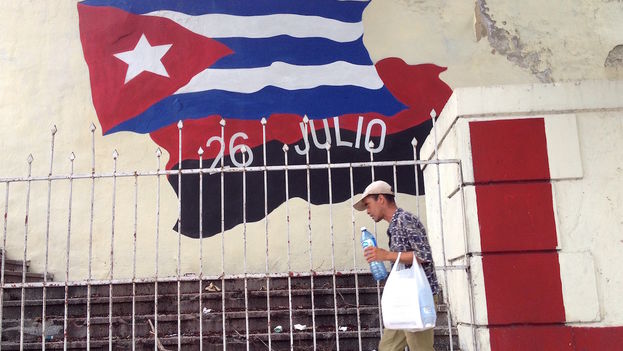
![]() 14ymedio, Reinaldo Escobar, Havana, 26 July 2016 – Sporting a hat to protect himself from the rays of the sun, Jose Ramon Machado Ventura explained in his speech for the 26th of July that the changes introduced in the Cuban model “are aimed at consolidating our socialism, to make more prospero (prosperous) and sustainable.” The keynote speaker at an event this morning in Sancti Spiritus realized immediately that he had omitted the enclitic pronoun “it” next to the verb “to make” and corrected it but introduced a new error: “To make it more proximo (next) and sustainable.”
14ymedio, Reinaldo Escobar, Havana, 26 July 2016 – Sporting a hat to protect himself from the rays of the sun, Jose Ramon Machado Ventura explained in his speech for the 26th of July that the changes introduced in the Cuban model “are aimed at consolidating our socialism, to make more prospero (prosperous) and sustainable.” The keynote speaker at an event this morning in Sancti Spiritus realized immediately that he had omitted the enclitic pronoun “it” next to the verb “to make” and corrected it but introduced a new error: “To make it more proximo (next) and sustainable.”
To the cheerful confusion of those who didn’t notice the initial grammatical slip, the vice president conveyed the impression that he hadn’t meant to say prosperous, but proximo (next). The correction thus became a political problem, because if there is something Cubans know it is that the promised socialism “without haste, but without pause” could be anything or have innumerable oddities, but in no way is it “next.”
Perhaps, later on, Machado Ventura will argue that the gaffe obeyed the desires that “all revolutionaries have to reach the goal for which they have fought.” However, the subtle equivocation, which doesn’t appear in the official version of the speech published in the state newspaper Granma, may have set listeners to thinking about the controversial issue of deadlines to deliver on certain promises.
At least three generations of Cubans have witnessed, for years, the commemorations around that fateful 26th of July 1953, a tragic date that has been cataloged – brazenly – as “the happiest day in history” in a chorus of the worst tune ever.
For decades, the interminable speeches that Fidel Castro delivered on the ceremonies of those events that immolated young people were expected as the moment when he would announce “the good news.” On the podium, index finger pointing skyward, he would prophesy a luminous future for the country and convince his audience of the inevitable and imminent materialization of utopia.
However, those times have passed and today the model of socialism that is debated among “hundreds of thousands of militants of the Party and of the Union of Young Communists, and representatives from all sectors of society,” with reference to the documents of the Seventh Communist Party Congress, shows no practical signs that it will bring prosperity, nor that it will be sustainable over the long term.
Instead, what is coming “next” is only the return of the economic difficulties now classified as temporary that characterized the most difficult years of the Special Period. These material limitations, in fact, never disappeared completely from daily life, but could get worse given the collapse of Venezuela and the economic dysfunction of the national model.
Machado Ventura referred this Tuesday to these conquests which had to be “temporarily” given up in the most acute phase of the Special Period, but indicated with optimism that “today they are practically all being recovered,” while “some belonged to that historic moment and it would not be rational to reestablish them.” He also spoke about other conquests, which he did not enumerate, that “are in a quantitative and qualitative phase superior to those years.”
The most important element of the vice president’s speech lay in its omissions, more than in its affirmations. The man who is seen as a recalcitrant orthodox avoided deciphering the enigma that now torments millions of Cubans and that has been converted into history in his wishy-washy speech. Did the Special Period end, or are we just going through a less acute phase? Is the current crisis a new stage in the chronic fall of the system, or is it the evidence of the “next” – that is the imminent – end of Castroism?
